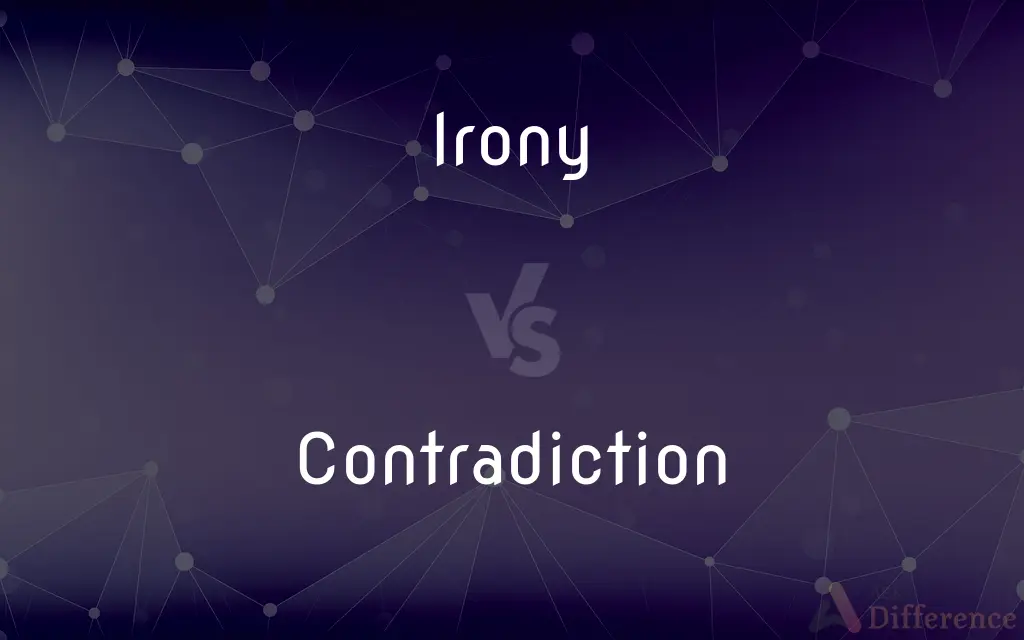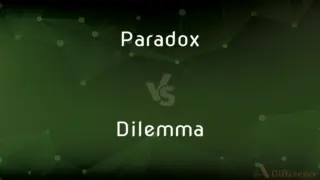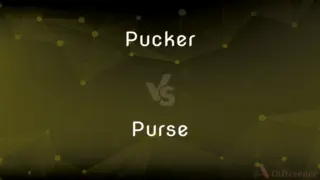Irony vs. Contradiction — What's the Difference?

Difference Between Irony and Contradiction
ADVERTISEMENT
Compare with Definitions
Irony
Irony (from Ancient Greek εἰρωνεία eirōneía 'dissimulation, feigned ignorance'), in its broadest sense, is a rhetorical device, literary technique, or event in which what on the surface appears to be the case or to be expected differs radically from what is actually the case. Irony can be categorized into different types, including verbal irony, dramatic irony, and situational irony.
Contradiction
In traditional logic, a contradiction occurs when a proposition conflicts either with itself or established fact. It is often used as a tool to detect disingenuous beliefs and bias.
Irony
The use of words to express something different from and often opposite to their literal meaning.
Contradiction
The act or an instance of contradicting
The witness's contradiction of other testimony.
Irony
An expression or utterance marked by a deliberate contrast between apparent and intended meaning
"the embodiment of the waspish don, from his Oxbridge tweeds to the bone-dry ironies of his speech and prose" (Ron Rosenbaum).
ADVERTISEMENT
Contradiction
The state of being contradicted
A supervisor who cannot tolerate contradiction from any subordinate.
Irony
Incongruity between what might be expected and what actually occurs
"Hyde noted the irony of Ireland's copying the nation she most hated" (Richard Kain).
Contradiction
An inconsistency or discrepancy
"Surprisingly few people saw a contradiction between freedom for whites and bondage for slaves" (Adam Hochschild).
Irony
An occurrence, result, or circumstance notable for such incongruity
The ironies of fate. See Usage Note at ironic.
Contradiction
Inconsistency; discrepancy
Practices that are in contradiction to human rights.
Irony
Dramatic irony.
Contradiction
One that contains elements that oppose or conflict with one another
The phrase "an unmarried husband" is a contradiction in terms.
Irony
Socratic irony.
Contradiction
The act of contradicting.
His contradiction of the proposal was very interesting.
Irony
(rhetoric) The quality of a statement that, when taken in context, may actually mean something different from, or the opposite of, what is written literally; the use of words expressing something other than their literal intention, often in a humorous context.
Contradiction
(countable) A statement that contradicts itself, i.e., a statement that claims that the same thing is true and that it is false at the same time and in the same senses of the terms.
There is a contradiction in Clarence Page's statement that a woman should have the right to choose and decide for herself whether to have an abortion and at the same time she should not have that right.
There is a contradiction in what you say: she can't be both married and single.
Irony
(countable) An ironic statement.
Contradiction
(countable) A logical inconsistency among two or more elements or propositions.
Marx believed that the contradictions of capitalism would lead to socialism.
Irony
Dramatic irony: a theatrical effect in which the meaning of a situation, or some incongruity in the plot, is understood by the audience, but not by the characters in the play.
Contradiction
A proposition that is false for all values of its propositional variables or Boolean atoms.
Irony
Socratic irony: ignorance feigned for the purpose of confounding or provoking an antagonist.
Contradiction
An assertion of the contrary to what has been said or affirmed; denial of the truth of a statement or assertion; contrary declaration; gainsaying.
His fair demandsShall be accomplished without contradiction.
Irony
(informal){{cite-journal
Contradiction
Direct opposition or repugnancy; inconsistency; incongruity or contrariety; one who, or that which, is inconsistent.
Can he make deathless death? That were to makeStrange contradiction.
We state our experience and then we come to a manly resolution of acting in contradiction to it.
Both parts of a contradiction can not possibly be true.
Of contradictions infinite the slave.
Irony
Of or pertaining to the metal iron.
The food had an irony taste to it.
Contradiction
Opposition between two conflicting forces or ideas
Irony
Made or consisting of iron; partaking of iron; iron; as, irony chains; irony particles; - In this sense iron is the more common term.
Contradiction
(logic) a statement that is necessarily false;
The statement `he is brave and he is not brave' is a contradiction
Irony
Resembling iron in taste, hardness, or other physical property.
Contradiction
The speech act of contradicting someone;
He spoke as if he thought his claims were immune to contradiction
Irony
Dissimulation; ignorance feigned for the purpose of confounding or provoking an antagonist.
Irony
A sort of humor, ridicule, or light sarcasm, which adopts a mode of speech the meaning of which is contrary to the literal sense of the words.
Irony
Witty language used to convey insults or scorn;
He used sarcasm to upset his opponent
Irony is wasted on the stupid
Satire is a sort of glass, wherein beholders do generally discover everybody's face but their own
Irony
Incongruity between what might be expected and what actually occurs;
The irony of Ireland's copying the nation she most hated
Irony
A trope that involves incongruity between what is expected and what occurs
Share Your Discovery

Previous Comparison
Paradox vs. Dilemma
Next Comparison
Pucker vs. Purse














































